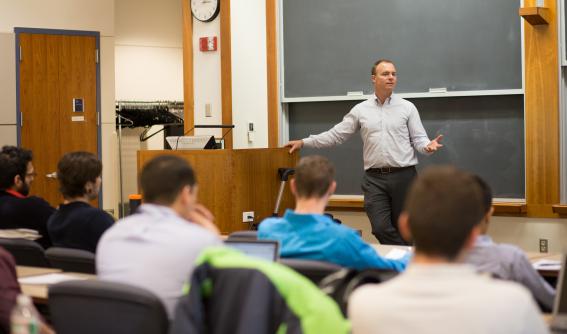Isenberg Alum Shares Financial Trading Insights
November 10, 2015

“I’ve traded derivatives my entire career,” Gary told the students. Among the personal attributes that make for a successful trader, Cameron gave high points to “the ability to hold an evaluation matrix in your head”—to devise alternative what-if scenarios and outcomes. At the same time, “You can’t be too smart. You’ll talk yourself out of everything,” he said.
You also have to balance analytical prowess with interpersonal skills that support relationships, he continued. “Most important is trading with a complete lack of ego,” he emphasized. “We’re all Type A’s.” When things go awry—and they will—you have to accept and move on.
Cameron also emphasized integrity. “My teams have been 100% honest,” he remarked. You have one chance at it—to secure your good name. If you cut corners, you will get caught, he insisted.
Precarious Bubbles and their Aftermath
Cameron’s classroom talk explored managing the effects of margin debt in financial markets. He discussed hedging against volatility and potential bubbles, by deploying derivatives, swaps, and other financial instruments.
“People get ahead of themselves,’ he observed, citing excessively leveraged, demand-obsessed markets and their precarious bubbles. The Isenberg graduate was in the thick of financial crises as a trader during the late 1980s freefall, the internet bubble of 2000, and the Great Recession of 2008 with its real estate crisis. During the latter, a paralyzed financial community turned to the U.S. government, which responded with TARP legislation—for better and for worse.
To explore margin debt, consider China, said Cameron, with its 50% portfolio leverage. Unlike Europe, which mistrusts equities markets, China finds them exciting. In short order, China created the world’s second largest economy. But the market has come down 35%, he told the students.
Cameron is overseeing a team of six students in Sherman’s class who are dissecting recent high equity market volatility and weakness. Much of the upward price action appears to have originated in China. “What I’ve asked you to work on is a tall order,” Cameron remarked. “Which stock do you think best represents China? Is it Ali Baba? Should you buy it or short it?”
Growing Job Market Leverage for Isenberg Students
At J.P. Morgan, Cameron has been a catalyst in securing internships for Isenberg students. He and his employer have not been disappointed. “Almost every intern has gotten a job offer,” he remarked. “In fact, UMass has the highest retention rate of any school in our program. When I was at Isenberg, a UMass degree did not open doors [on Wall Street]. That is changing. Have pride in Isenberg and your degree!”